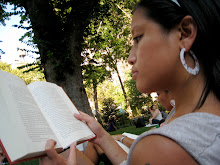
I think, at its heart, this novel is about the perils of being a dreamer. For those of this nature, it is far too easy to get caught up in your own thoughts, and thus, to ignore the damage you are enacting. The Children's Book focuses on the lives of the Wellwood family and their friends. In the late 19th century, they are immersed in the height of England's Fabian socialist movement. They believe in a society of free love, and a clean, simple livelihood enforced by literature, art and nature. Their children are brought up thus and the effects of such a bringing up have fierce and startling echoes down the line.
It is an eminently rich book, peopled with various fascinating characters, both dreamers and pragmatics alike. Shot through with poetic and literary references, a deep reverence for the pottery art of the time and a keen understanding of the various political/social elements of the period before WWI, it is a book worthy of the Man Booker nomination. AS Byatt has a supreme knack for combining such disparate elements, winding them neatly throughout a book, to create an effect that causes both rumination, fascination and an intense desire to understand the characters on a deeper level.
I, myself, am a dreamer. While reading, I've realized that dreamers and zealots have much in common. Both believe fiercely in a world that has yet to exist, and may never exist. It's the pragmatists, in the end, who, even through disaster and strife, have the gumption to keep on. But do they miss out on what it is to hope and dream? What it is to feel so absolutely impassioned by an idea?
It is an eminently rich book, peopled with various fascinating characters, both dreamers and pragmatics alike. Shot through with poetic and literary references, a deep reverence for the pottery art of the time and a keen understanding of the various political/social elements of the period before WWI, it is a book worthy of the Man Booker nomination. AS Byatt has a supreme knack for combining such disparate elements, winding them neatly throughout a book, to create an effect that causes both rumination, fascination and an intense desire to understand the characters on a deeper level.
I, myself, am a dreamer. While reading, I've realized that dreamers and zealots have much in common. Both believe fiercely in a world that has yet to exist, and may never exist. It's the pragmatists, in the end, who, even through disaster and strife, have the gumption to keep on. But do they miss out on what it is to hope and dream? What it is to feel so absolutely impassioned by an idea?











